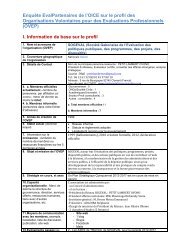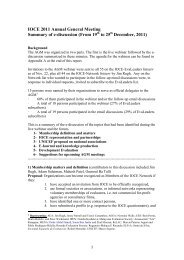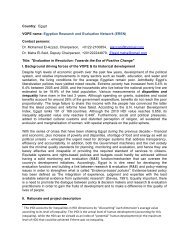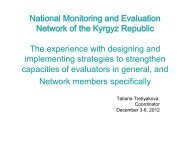The Program Evaluation Standards in International Settings
The Program Evaluation Standards in International Settings - IOCE
The Program Evaluation Standards in International Settings - IOCE
Create successful ePaper yourself
Turn your PDF publications into a flip-book with our unique Google optimized e-Paper software.
<strong>The</strong> Appropriateness of Jo<strong>in</strong>t Committee <strong>Standards</strong> <strong>in</strong> Non-Western Sett<strong>in</strong>gs 47P1 Service Orientation. Korean evaluation projects may not serve the needs of the fullrange of target population. In most <strong>in</strong>ternational evaluation projects, the central government orbus<strong>in</strong>ess conglomerates oversee them. S<strong>in</strong>ce other <strong>in</strong>dependent research firms and their fundrais<strong>in</strong>g activities are not popular <strong>in</strong> Korea, evaluation projects are usually sponsored by thegovernment or bus<strong>in</strong>ess corporations' budget<strong>in</strong>g offices. <strong>The</strong> range of the audience is not verybroad, with top executives and <strong>in</strong>ternal staff members among the client group. Immediatestakeholders <strong>in</strong>clude the people whose work or bus<strong>in</strong>ess structure is be<strong>in</strong>g evaluated. In the caseof government projects, evaluation results reach the whole nation. It is unique for Koreans todeal with stakeholder groups <strong>in</strong> conduct<strong>in</strong>g any evaluation project. <strong>The</strong> ideal is to <strong>in</strong>volvepotential stakeholder groups and strive to ascerta<strong>in</strong> and accommodate their <strong>in</strong>formation needs.However, s<strong>in</strong>ce the nation's or the group's <strong>in</strong>terest is frequently more important, the <strong>in</strong>dividual'sor small stakeholder group's <strong>in</strong>terest may not be significantly considered. Sometimes the lattermay be ignored completely. Only a small part of the stakeholder group, the immediatestakeholder, is considered <strong>in</strong> the evaluation design. Accord<strong>in</strong>gly, the project focus is likely to bedeterm<strong>in</strong>ed by the specific client group that supports and controls the project.F2 Political Viability. Even though Wholey (1981) made it clear that evaluation f<strong>in</strong>d<strong>in</strong>gscan rarely change the power structure, but can promote someth<strong>in</strong>g. However, <strong>in</strong> Korea, the utilityof project results can be more than that. Sometimes, the results of a project might be used forpolitical purposes which were not the <strong>in</strong>tention at all <strong>in</strong> the beg<strong>in</strong>n<strong>in</strong>g stages. Also, the successfulcompletion of an evaluation project can be thwarted <strong>in</strong> a political system where def<strong>in</strong>ition ismore a political exercise than a technical one, where radical ideas about solutions occur lessoften than m<strong>in</strong>or variations <strong>in</strong> the status quo and where adopt<strong>in</strong>g successful solutions isdependent on practical ability and professional discretion as much as on efficacy. <strong>The</strong>refore,"be<strong>in</strong>g a responsible evaluator" depends on excellent communication with the decision-makers.<strong>The</strong>y are, <strong>in</strong> most cases, the top client group.A2 Context Analysis. It is hard for foreign evaluators to understand the sociopoliticalcontext of evaluation research and the political effects of an evaluation project. In a complicatedsociopolitical context, western evaluators should be s<strong>in</strong>cere with clients who call for anevaluation project. As time goes by, they may be gett<strong>in</strong>g more familiar with the situationalcontext a certa<strong>in</strong> evaluation project is <strong>in</strong>volved <strong>in</strong>, as well as the political relationships amongdifferent stakeholders and clients while conduct<strong>in</strong>g a project with Korean staff members.However, they should first focus on who the top client is, and what their basic values are,because the project will be conducted under the top clients' direction. This means that the projectfocus is <strong>in</strong> the hands of the top clients. <strong>The</strong>y will be the ones who support the project performedby western evaluators <strong>in</strong> terms of human and physical resources. For example, evaluators shouldask Korean clients to <strong>in</strong>dicate any cultural and technical pitfalls, expectations, and potentialproblems before they start to work. While apply<strong>in</strong>g their expertise, they should cont<strong>in</strong>uously askclients for assistance. <strong>The</strong> <strong>in</strong>ternal staff members who work with western evaluators represent atop client group, while at the same time play roles as mediators between evaluators and clients,and reporters with western evaluators. <strong>The</strong>y may or may not be immediate stakeholders.






